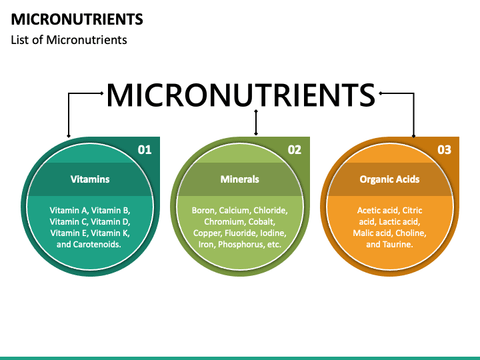What Are Micronutrients and Why Do You Need Them?

What Are Micronutrients and Why Do You Need Them?
When it comes to eating a balanced diet, you have probably heard of macronutrients such as carbohydrates, proteins, and fats. But what about micronutrients? Even though they are tiny, micronutrients are essential for your body to function properly. From vitamins A-K to folate, folic acid, choline, and vitamin D, these important nutrients are integral in promoting optimal health throughout the body by carrying out vital bodily processes like growth and development. Keep reading to learn more about micronutrients and why you need them!
What are Micronutrients?

Micronutrients are essential vitamins and minerals our bodies require in small amounts for optimal growth and development. These nutrients cannot be produced in the body and must be consumed through the diet. Micronutrients are crucial in various bodily functions, including metabolism, immunity, and cardiovascular health.
There are two main types of micronutrients: vitamins and minerals. Vitamins are organic compounds that our bodies require in small amounts to maintain the overall health of our body tissues, nerves, and organs. On the other hand, minerals are inorganic compounds that play a vital role in maintaining fluid balance, building strong bones and teeth, and regulating the functioning of nerves.
Among the most critical micronutrients are vitamins A, C, D, E, and K, along with the B vitamins such as thiamine, riboflavin, niacin, B6, B12, and folate. Essential minerals include calcium, magnesium, iron, and zinc. Micronutrient deficiencies can cause various health complications, such as anemia, vision problems, weakened immune systems, and cognitive impairments. Herbalife supplements provides you with required nutrients to support growth and development.
Why Do We Need Micronutrients?

Micronutrients are essential for our body as they are crucial in maintaining good health and well-being. These nutrients include vitamins, minerals, and trace elements, all of which are required in small amounts for the proper functioning of our body and normal growth.
One of the primary reasons why we need micronutrients is to maintain optimal physical and mental health. For example, a deficiency of vitamin D can lead to weakened bones, while a deficiency of vitamin C can result in scurvy. Similarly, a lack of iron in the diet can cause anemia, and a deficiency of iodine can lead to goiter.
Micronutrients also play a vital role in supporting our immune system, thus helping us fight against infections and diseases. They help in the production of enzymes, hormones, and other essential compounds that regulate various functions in our body.
Additionally, micronutrients are crucial for cognitive development and brain function. They help in neural communication and synapse formation, which is essential for learning, memory, and information processing.
Types of Micronutrients In A Healthy Diet

Micronutrients are nutrients the human body requires in small amounts for growth, development, and maintenance of physiological functions. They include vitamins and minerals, essential dietary components responsible for the proper functioning of the human body.
Vitamins are organic molecules necessary in small quantities to sustain normal body metabolism. They are classified as either fat-soluble or water-soluble vitamins. Fat-soluble vitamins include vitamins A, D, E, and K, while water-soluble vitamins contain B-complex and C.
Minerals are inorganic elements vital for the proper functioning of the body. There are two types of minerals: major and trace minerals. Major minerals are required by the human body in relative amounts, including calcium, potassium, magnesium, and sodium, while trace minerals are essential but required in smaller quantities, such as selenium, copper, and zinc.
Furthermore, antioxidants are essential micronutrients that protect cells from damage caused by free radicals. They include vitamins E, C, and beta-carotene, which have been linked to the prevention of chronic diseases such as cancer and heart disease. Herbalife nutrition products can provide you with all the essential vitamins and minerals.
Health Benefits of Micronutrients

Micronutrients are nutrients required in small quantities for the proper functioning of the human body. Although micronutrients are required in small amounts, they are vital in maintaining good health. A diet rich in micronutrients has numerous health benefits, including improved vision, bones, immunity, and cognitive function.
Vitamins A, C, E, and selenium act as antioxidants and protect our cells from damage caused by free radicals. Vitamin D, calcium, and phosphorus are essential for healthy bones, while zinc and iron are crucial in immune function.
Micronutrients are also essential for cognitive function, regulating mood, sleep, and memory. Studies show that micronutrient deficiencies like vitamin B6, B12, and folate can lead to depression, anxiety, and other mental health issues.
Consuming a balanced diet that includes a variety of fruits, vegetables, whole grains, protein, and healthy fats is the best way to ensure that you meet your daily micronutrient requirements. In conclusion, micronutrients are essential nutrients that offer numerous health benefits. A balanced diet is crucial in achieving optimal levels of these nutrients.
Getting Essential Nutrients From Food
Foods with Trace Minerals
Trace minerals play a critical role in promoting a healthy body. These minerals are not required in large amounts, but their absence can lead to several deficiencies and ailments. Some trace minerals include zinc, copper, iron, selenium, manganese, fluoride, and chromium. To ensure optimal health, consuming a balanced diet with foods containing these essential trace minerals is important.
Seafood such as tuna, shrimp, crab, and oysters are excellent sources of trace minerals. Meat, poultry, and dairy products also contain significant minerals. Whole grains, nuts, and legumes are other rich sources of trace minerals. For example, lentils and chickpeas are rich in iron, while pumpkin seeds contain high amounts of zinc. Dark chocolate, berries, and leafy vegetables also contain trace minerals that promote good health.
Foods with Water-Soluble Vitamins
As the name suggests, water-soluble vitamins dissolve in water and are essential for human health. These vitamins include vitamin B and C, important in energy metabolism, immune function, and collagen synthesis. Unlike fat-soluble vitamins, water-soluble vitamins cannot be stored in the body, and their excess is excreted in the urine, making it important to consume these vitamins regularly as part of a balanced diet.
Citrus fruits such as oranges, lemons, and grapefruits are excellent sources of vitamin C. Other fruits such as kiwi, papaya, and strawberries are also great sources of this essential vitamin. Whole grains, leafy vegetables, eggs, and dairy products are excellent sources of vitamin B, which includes eight different vitamins. For example, whole grains provide vitamins B1 and B2, while dairy products contain vitamin B12. Leafy vegetables such as spinach and kale are a rich source of B vitamins and other micronutrients that promote optimal health.
Foods with Fat-Soluble Vitamins
Fat-soluble vitamins are essential micronutrients that the body cannot produce and must be obtained from the diet. These vitamins, which include vitamins A, D, E, and K, are typically found in high-fat foods like nuts, seeds, and oils. Vitamin A enhances vision, supports the immune system, and promotes skin health. Rich sources of vitamin A include liver, sweet potatoes, and carrots. Vitamin D is required for strong bones and teeth and is found in fatty fish like salmon and mackerel. Vitamin E, a potent antioxidant that helps protect cells from damage, is abundant in nuts and seeds like almonds and sunflower seeds. Finally, vitamin K, crucial for blood clotting and calcium regulation, is concentrated in leafy green vegetables like spinach and broccoli. Incorporating these foods into your diet can help maintain adequate levels of these nutrients.
Foods with Micro-minerals
Micro-minerals are small but mighty minerals that are necessary for optimal health. These trace minerals, including chromium, copper, iron, manganese, and zinc, play diverse roles in the body, supporting everything from metabolism to immune function. Chromium, for example, helps regulate blood sugar levels and can be found in broccoli and whole grains. Copper is essential for the formation of red blood cells and can be found in shellfish, liver, and nuts. Iron, crucial for oxygen transport and energy production, is abundant in red meat, leafy green vegetables, and beans. Manganese, which helps with bone development and wound healing, can be obtained from whole grains, nuts, and leafy greens. Finally, zinc, important for immune function and wound healing, is found in oysters, beef, and beans. While these minerals are needed in small amounts, ensuring you incorporate them into your diet is essential for optimal health.
Conclusion

We now better understand what exactly micronutrients are and how they help our bodies. They are indispensable components of a balanced, healthy diet and can play an important role in overall health and well-being. While there is no single "perfect" source for obtaining all the essential micronutrients, adding more nutrient-rich foods to your diet is one way to ensure you get the nourishment your body needs. Additionally, consulting with a nutritionist or healthcare provider can help you determine if any dietary adjustments need to be made. And lastly, taking daily multi-minerals and vitamins can help bridge any nutritional gaps in order to maintain good health and vitality. With that said, it's essential to remember that micronutrient intake should always be tailored to individual needs; everyone's body requires different nutrients in different amounts throughout their life. So be sure to pay close attention to your own unique requirements when it comes to micronutrient consumption - because being well-nourished makes all the difference!
